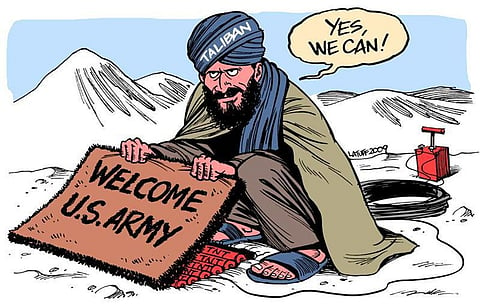
- Union Budget 2026
- Home
- NewsGram USA
- India
- न्यूजग्राम
- World
- Politics
- Entertainment
- Culture
- Lifestyle
- Economy
- Sports
- Sp. Coverage
- Misc.
- NewsGram Exclusive
- Jobs / Internships

https://youtu.be/Kh3C4c9zRb8
May 23, 2016: The ongoing ground preparation for a leadership transition by the insurgent leaders proves the death of Mullah Mansoor in a U.S drone attack. But, this was not officially confirmed or denied by the Afghan Taliban.
In a Pashto-language statement released to pro-Taliban media outlets, a senior member of the group's so-called Rahbari Shura, or leadership council, has urged Taliban fighters "not to pay attention and desist from drawing conclusions" about the fate of Mansoor in the wake of "self-created" reports.
In the statement, an unnamed council member pointed to what he said were "enormous sacrifices" by the Taliban and added that the movement would not let the enemy divide and weaken the movement.
"The Islamic Emirate [the Taliban] will gain strength from the sacrifices of its leaders. All the members and other leaders in the movement think alike and are capable of leading come what may," he asserted.
Another Taliban official, quoted in a separate statement, said that the movement would not "weaken and deter" even if news of the death of its leader was accurate. The group, he maintained, did not rely on any one individual and was capable of swiftly filling a leadership vacuum.
He asserted that the death of Mansoor, if true, would only boost the Taliban ranks and create additional security challenges for the United States and the Kabul regime.
Commander of NATO forces in Afghanistan, U.S. General John Nicholson reiterated on Tuesday that Mansoor was blocking peace and reconciliation efforts. "Two days ago we killed Mullah Mansour because he stood in the way of peace," the general said while speaking in southern Afghan city of Kandahar bordering Pakistan.
Meanwhile, members of the leadership council of the Taliban have reportedly been meeting at an undisclosed location to elect their new leader and an announcement could be expected within the next couple of days.
But the Taliban has so far avoided publicly commenting on any development related to the fate of Mansoor.
Possible Mansoor successors
His two deputies, Sirajuddin Haqqani and Maulvi Haibatullah as well as Mullah Yaqoob, the elder son of the group's founder, Mullah Omar, are said to be among the top contenders.
Observers with knowledge of Taliban affairs and even some insurgent sources suggest that Yaqoob, in his late 20s, could be the next Taliban leader.
He is currently commanding military operations in 15 of Afghanistan's 34 provinces. Some Taliban officials believe Yaqoob's elevation to the top position could help unify the insurgency and overcome divisions noted since last July when Mansoor took charge after it was confirmed Mullah Omar had been dead for more than two years.
President Barack Obama on Monday confirmed that Mansoor was killed in a drone attack on Saturday.
The Taliban leader was traveling in a vehicle in the southwestern Baluchistan province near the Afghan border when the missiles struck him. His driver, identified as Mohammad Azam, was also killed.
The bodies were transported to Quetta, where relatives were handed Azam's remains in the presence of media. But it it still unclear what has happened to remains of the other body.
Taliban's silence
Meanwhile, Taliban spokespeople have continuously been sending statements claiming battlefield successes since the U.S announced the killing of Mansoor on Saturday. But they have not responded to queries about the fate of their top leader.
An insurgent spokesman, Qari Yousaf Ahmadi, assigned to discuss affairs in southern Afghanistan, on Tuesday denied Kabul's claims that the Taliban's shadow governor for southern Helmand province and a brother of the group's late leader, Mullah Omar, were killed in overnight U.S. airstrikes in the area.
Omar's brother, Mullah Abdul Manan, is also among the Taliban leaders being projected as possible successors for Mansoor.
Afghan commentators and politicians in media interactions have expressed fears the death of Mansoor will lead to more violence and appeared less optimistic about peace talks.
Impact on peace prospects
It put the final nail in attempts to find a political way of out of the Afghan conflict, said Marvin Weinbaum, director of the Center for Pakistan Studies at the Middle East Institute.
"None of the likely claimants to the Taliban's helm is likely to join a peace process. Mansour's death may set off a new leadership struggle, but is unlikely to weaken the insurgency in Afghanistan," says Weinbaum.
Baluchistan borders western and southern Afghan provinces that are traditionally considered Taliban heartlands.
U.S and Afghan officials have long maintained that Taliban's leadership council, usually referred to as Quetta Shura, has been operating from the Pakistani province.
"The direct order by President Barack Obama that Mansour be killed makes it clear that the Afghan conflict will be settled on the battlefield, not at a conference table," Weinbaum.
Islamabad acknowledges presence of Taliban leaders on its side of the border, but blames the long porous frontier with Afghanistan.
Mansoor's Pakistani passport and travel history, though the documents are under a pseudonym Wali Mohammad, suggest he lived and traveled freely and with impunity within Pakistan and was even allowed to travel abroad through the country's airports to multiple destinations, including repeated trips to Dubai.
Pakistani officials, however, say an investigation is still underway to determine the identity of the second man killed in the US drone attack.
Several suspects have been detained and authorities in Karachi have raided a residential apartment in the name of Wali Mohammad based on the address in the Pakistani passport and national identification card.
